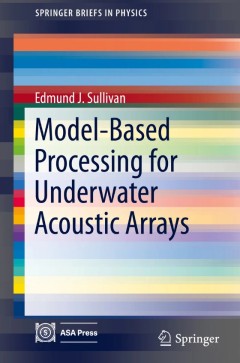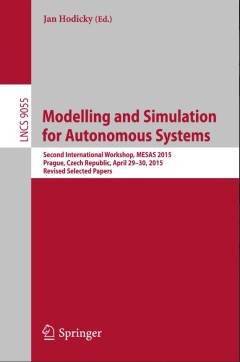Filter by

Elucidation of Abiotic Stress Signaling in Plants Functional Genomics Perspe…
Abiotic stresses such as high temperature, low-temperature, drought, and salinity limit crop productivity worldwide. Understanding plant responses to these stresses is essential for rational engineering of crop plants. In Arabidopsis, the signal transduction pathways for abiotic stresses, light, several phytohormones and pathogenesis have been elucidated. A significant portion of plant genomes …
- Edition
- 1
- ISBN/ISSN
- 978-1-4939-2540-7
- Collation
- 1 b/w illustrations, 26 illustrations in colour
- Series Title
- -
- Call Number
- -

Elucidation of Abiotic Stress Signaling in Plants Functional Genomics Perspe…
Abiotic stresses such as high temperature, low-temperature, drought, and salinity limit crop productivity worldwide. Understanding plant responses to these stresses is essential for rational engineering of crop plants. In Arabidopsis, the signal transduction pathways for abiotic stresses, light, several phytohormones and pathogenesis have been elucidated. A significant portion of plant genom…
- Edition
- 1
- ISBN/ISSN
- 978-1-4939-2211-6
- Collation
- 6 b/w illustrations, 29 illustrations in colour
- Series Title
- -
- Call Number
- -

Model-Based Processing for Underwater Acoustic Arrays
This monograph presents a unified approach to model-based processing for underwater acoustic arrays. The use of physical models in passive array processing is not a new idea, but it has been used on a case-by-case basis, and as such, lacks any unifying structure. This work views all such processing methods as estimation procedures, which then can be unified by treating them all as a form of joi…
- Edition
- 1
- ISBN/ISSN
- 978-3-319-17556-0
- Collation
- X, 113
- Series Title
- SpringerBriefs in Physics
- Call Number
- -

Elements of Plasma Technology
This book presents some fundamental aspects of plasma technology that are important for beginners interested to start research in the area of plasma technology. These include the properties of plasma, methods of plasma generation and basic plasma diagnostic techniques. It also discusses several low cost plasma devices, including pulsed plasma sources such as plasma focus, pulsed capillary disch…
- Edition
- 1
- ISBN/ISSN
- 978-981-10-0117-8
- Collation
- 12 b/w illustrations, 93 illustrations in colour
- Series Title
- -
- Call Number
- -

The Science of Human Evolution
This textbook provides a collection of case studies in paleoanthropology demonstrating the method and limitations of science. These cases introduce the reader to various problems and illustrate how they have been addressed historically. The various topics selected represent important corrections in the field, some critical breakthroughs, models of good reasoning and experimental design, and im…
- Edition
- -
- ISBN/ISSN
- 978-3-319-41585-7
- Collation
- -
- Series Title
- -
- Call Number
- -

Microbial-mediated Induced Systemic Resistance in Plants
With a focus on food safety, this book highlights the importance of microbes in sustainable agriculture. Plants, sessile organisms that are considered as primary producers in the ecosystem and communicate with above- and below-ground communities that consist of microbes, insects, and other vertebrate and invertebrate animals, are subjected to various kinds of stress. Broadly speaking, these can…
- Edition
- 1
- ISBN/ISSN
- 978-981-10-0387-5
- Collation
- X, 226
- Series Title
- -
- Call Number
- -

Modelling and Simulation for Autonomous Systems:Second International Workshop…
This book constitutes the thoroughly refereed post-workshop proceedings of the Second International Workshop on Modelling and Simulation for Autonomous Systems, MESAS 2015, held in Prague, Czech Republic, in April 2015. The 18 revised full papers included in the volume were carefully reviewed and selected from 33 submissions. They are organized in the following topical sections: state of the ar…
- Edition
- 1
- ISBN/ISSN
- 978-3-319-22382-7
- Collation
- XII, 241
- Series Title
- Lecture Notes in Computer Science
- Call Number
- -

Microstructure-Property Optimization in Metallic Glasses
This thesis consists of an in-depth study of investigating microstructure-property relationships in bulk metallic glasses using a novel quantitative approach by which influence of the second phase features on mechanical properties can be independently and systematically analyzed. The author evaluates and optimizes the elastic and plastic deformation, as well as the overall toughness of cellular…
- Edition
- 1
- ISBN/ISSN
- 978-3-319-13033-0
- Collation
- XIII, 89
- Series Title
- Springer Theses
- Call Number
- -

Electrospinning for High Performance Sensors
This book aims to present the different aspects of electrospinning for designing and fabricating high performing materials for sensors applied in gaseous and liquid environments. Since electrospinning is a versatile and inexpensive manufacturing technology, the book emphasizes the industrial applications perspective. The volume is an edited collection of the most recent and encouraging results …
- Edition
- 1
- ISBN/ISSN
- 978-3-319-14406-1
- Collation
- 107 b/w illustrations, 53 illustrations in colour
- Series Title
- -
- Call Number
- -

Electrophysiology of Unconventional Channels and Pores
This book is dedicated to the channels and pores that belong to an eclectic and ubiquitous class of unconventional - perhaps at times strange - pore-forming molecules, which nevertheless play fundamental roles in various organisms. These non-canonical channels may take on various and sometimes complex architectures, such as large beta-barrels or lipid-containing pores. They may originate from b…
- Edition
- 1
- ISBN/ISSN
- 978-3-319-20149-8
- Collation
- XI, 385
- Series Title
- -
- Call Number
- -
 Computer Science, Information & General Works
Computer Science, Information & General Works  Philosophy & Psychology
Philosophy & Psychology  Religion
Religion  Social Sciences
Social Sciences  Language
Language  Pure Science
Pure Science  Applied Sciences
Applied Sciences  Art & Recreation
Art & Recreation  Literature
Literature  History & Geography
History & Geography